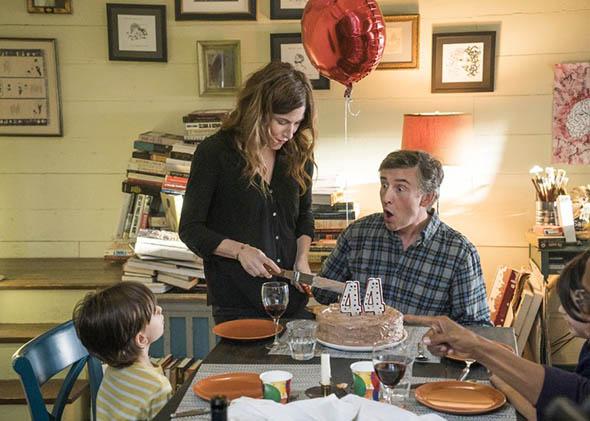Shalom Auslander, creator of the new Showtime series Happyish, is a gloomy, guilt-ridden, miserable man. Professionally. That’s his schtick. Raised an Orthodox Jew, the fortysomething Auslander now makes his living peddling angsty personal essays about his tortured relationship to pornography, or to defecation, or to humanity in general. He’s declared, “I hate mankind.” He’s called life a “festering pile of maggot-ridden shit.”
Misery loves company, they say, and perhaps that’s what Showtime’s banking on here. Maybe millions of depressives will tune in to commiserate with Thom Payne (get it? pain!), the dour protagonist Auslander has conjured for his show and, it seems clear, has modeled on himself. Based on what I’ve seen from the Happyish pilot, I won’t be among the millions.
Which is a shame. I harbor high hopes for all Steve Coogan vehicles. I’ve been a Cooganhead since the Alan Partridge days, up through 24-Hour Party People and, more recently, The Trip and its sequel. Coogan is masterful at portraying characters who conceal a stubborn core of decency beneath a layer of oily, amoral smarm.
As such, Coogan is perfectly suited to play someone like Thom Payne—an advertising executive who despises his industry and himself. The show opens as Payne is mourning the arrival of his 44th birthday and, with it, a suite of middle-age health concerns and a terror of being left behind at work. His ad firm has recently been annexed by a pair of young whippersnappers with lots of new ideas. “I expect to be replaced by a fucking app,” his boss frets.*
Our modern moment is ripe for meditations on contentment and how best to find it. Just this week, a book review in Quartz assessed “the happiness industry,” arguing that when it comes to seeking bliss, we’re doing it wrong. But the exploration of happiness in Happyish is, unhappily, much too glib.
Thom Payne is not unhappy in an interesting way. He’s a garden variety misanthrope, deeply unsatisfied despite his lucrative job, his loving wife, and his healthy son. He nurses many trivial, trite resentments. He rails against the creep of social media and corporate brands into everyday life. He calls people he doesn’t like “Satan,” and his metaphor for enduring workplace indignities is that he’s “got to suck some cock.” In short: He’s the guy at a party you smile wanly at and then quickly flee from. (I hear you saying, “This sounds like Larry David! I love Larry David!” He’s not Larry David.)
We’re meant to marvel at the show’s highbrow references to luminaries like Samuel Beckett and Albert Camus. But there’s no actual grappling with the ideas of these authors—just some cherry-picked quotes to lend the show a gloss of smartitude. This is refrigerator magnet philosophy.
Happyish seems at pains to distinguish itself from Mad Men, another show that dramatizes anhedonia in the world of marketing. “Fuck Mad Men,” says Payne in a meta-moment during one of his many overwritten voiceover monologues. Oh, please. Happyish has none of the careful ambience or thematic complexity of Mad Men. Instead, it leans on tired jokes about vaginal rejuvenation and Viagra. It’s more akin to a show like Californication—another Showtime series that papered empty pretention over crass sex humor and called it a day.
Happyish was originally meant to star Philip Seymour Hoffman. He filmed a pilot before he died. It’s not possible to watch the show starring Coogan without wondering how it might have been different starring Hoffman. Perhaps the soulful gravitas that Hoffman always managed to bring to his schlubbier roles might have played better than the manic sputtering of Coogan. But I doubt it. The cast is not the problem with this show. Talented actors like Coogan, Kathryn Hahn, Bradley Whitford, and Ellen Barkin are all quite capable of bringing zingy dialogue and nuanced characters to life, when provided with such. Here, they’re provided material that’s neither very good nor very bad. It’s just kind of … crappyish.
If you’re looking for art about midlife angst and the search for meaning in a fast-paced, superficial world, may I instead recommend Noah Baumbach’s While We’re Young? Or, even better, Bill Forsyth’s Local Hero. Misery loves company, but it also loves a light at the end of the tunnel.
*Correction, April 24, 2015: This article originally misattributed the quote, “I expect to be replaced by a fucking app,” to Thom Payne. It is actually spoken by Jonathan Cooke. (Return.)
